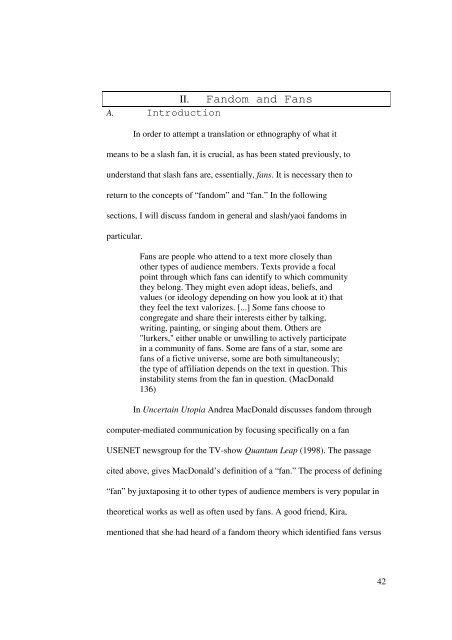Girls who like Boys who like Boys – Ethnography of ... - Yuuyami.com
Girls who like Boys who like Boys – Ethnography of ... - Yuuyami.com
Girls who like Boys who like Boys – Ethnography of ... - Yuuyami.com
You also want an ePaper? Increase the reach of your titles
YUMPU automatically turns print PDFs into web optimized ePapers that Google loves.
II. Fandom and Fans<br />
A. Introduction<br />
In order to attempt a translation or ethnography <strong>of</strong> what it<br />
means to be a slash fan, it is crucial, as has been stated previously, to<br />
understand that slash fans are, essentially, fans. It is necessary then to<br />
return to the concepts <strong>of</strong> “fandom” and “fan.” In the following<br />
sections, I will discuss fandom in general and slash/yaoi fandoms in<br />
particular.<br />
Fans are people <strong>who</strong> attend to a text more closely than<br />
other types <strong>of</strong> audience members. Texts provide a focal<br />
point through which fans can identify to which <strong>com</strong>munity<br />
they belong. They might even adopt ideas, beliefs, and<br />
values (or ideology depending on how you look at it) that<br />
they feel the text valorizes. [...] Some fans choose to<br />
congregate and share their interests either by talking,<br />
writing, painting, or singing about them. Others are<br />
"lurkers," either unable or unwilling to actively participate<br />
in a <strong>com</strong>munity <strong>of</strong> fans. Some are fans <strong>of</strong> a star, some are<br />
fans <strong>of</strong> a fictive universe, some are both simultaneously;<br />
the type <strong>of</strong> affiliation depends on the text in question. This<br />
instability stems from the fan in question. (MacDonald<br />
136)<br />
In Uncertain Utopia Andrea MacDonald discusses fandom through<br />
<strong>com</strong>puter-mediated <strong>com</strong>munication by focusing specifically on a fan<br />
USENET newsgroup for the TV-show Quantum Leap (1998). The passage<br />
cited above, gives MacDonald’s definition <strong>of</strong> a “fan.” The process <strong>of</strong> defining<br />
“fan” by juxtaposing it to other types <strong>of</strong> audience members is very popular in<br />
theoretical works as well as <strong>of</strong>ten used by fans. A good friend, Kira,<br />
mentioned that she had heard <strong>of</strong> a fandom theory which identified fans versus<br />
42


